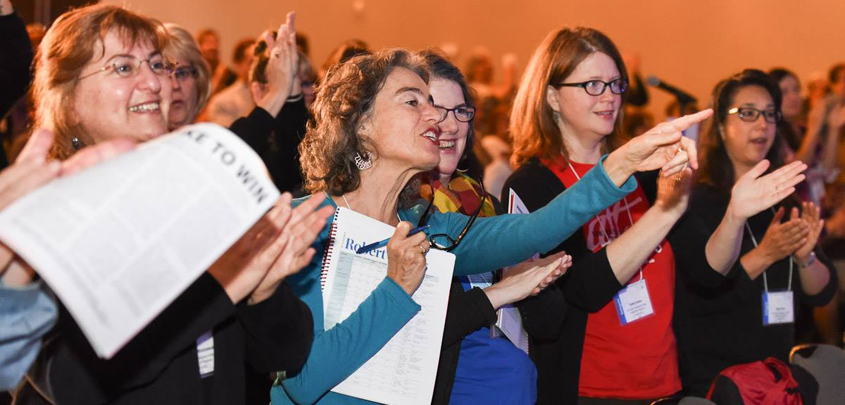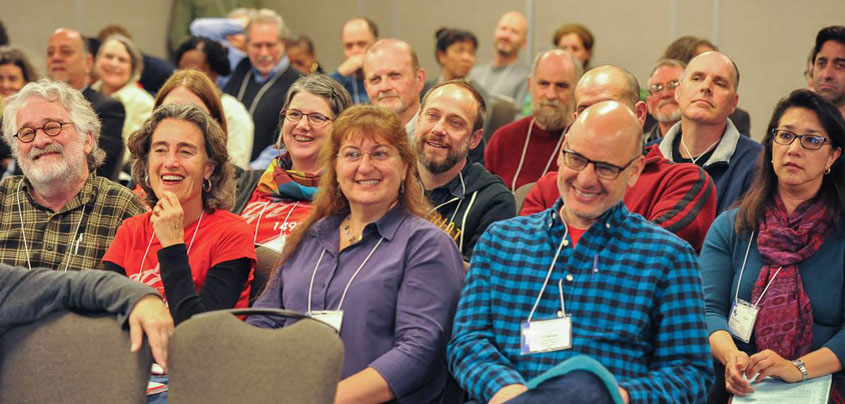April 2016 Advocate: CFT Convention report
CFT Convention inspires faculty to work for social justice in classrooms, in politics and in the community
By Katharine Harer, AFT 1493 Co-Vice President & Strategic Campaign Initiative (SCI) Organizer and Teeka James, AFT 1493 President
Our Local sent nine delegates and one guest, a record-breaking number, to the 74th statewide convention of the California Federation of Teachers, held at the Hyatt Embarcadero in San Francisco March 11th -13th. In total, over 500 delegates from around the state attended, and if you add in guests, there were nearly 600 of us in the house. As always, we participated in the Community College Council meeting held on Friday evening and a series of general sessions where inspiring speakers, such as writer/activists, Tim Wise and Jeremy Brecher, as well as AFT President, Randi Weingarten, addressed the crowd. Resolutions from various committees were debated and voted on throughout the convention, and we attended workshops on a wide range of topics, such as “Reclaiming the Promise of Racial Equity” and “Labor and Climate Change.”
Prop. 30 extension & Prop. 13 reform needed to support education funding
CFT President, Josh Pechthalt, spoke about the importance of the Proposition 30 Extension campaign and that we all need to work on gathering enough signatures to get it on the ballot. He said the governor is reluctant to support it and will probably come in neutral. According to Pechthalt, the Proposition 30 Extension is pretty much the same as the original “Millionaire’s Tax” because it won’t include a sales tax in its new iteration. Pechthalt declared: “We can’t go back to the days prior to Prop. 30 funding.” Even though this year was a banner year for community college funding because of Prop. 30, the governor still refused to increase COLA more than a minimal .47%.
CFT Vice President, Jeff Freitas, spoke about the danger of another Fredrich’s-type decision that could do away with fee payers. Even though we dodged the latest bullet, there are more than 27 different cases in the legal system that could do the same kind of damage to organized labor. If the CFT loses its support from fair-share fee payers, the statewide union would lose 11% of its yearly budget. Freitas also spoke about the “Make It Fair” campaign to reform Prop. 13 and create a split roll, which would separate residential property from large businesses. This new and improved Prop. 13 could generate $9 billion a year for education.
 AFT 1493 delegates (l. to r.) Monica Malamud, Katharine Harer, Michelle Kern, Teeka James and Nina Floro at a CFT Convention general session
AFT 1493 delegates (l. to r.) Monica Malamud, Katharine Harer, Michelle Kern, Teeka James and Nina Floro at a CFT Convention general session
How schools can help liberate instead of reinforcing social inequities
Anti-racist essayist, author, and educator Tim Wise gave the keynote address on Saturday morning. Titled “Racism as Divide and Conquer, from the 1600s to Donald Trump,” Wise’s address traced the roots of social, political, and economic inequity in the United States and explained how our American educational system perpetuates those inequities. Using a functionalist framework, Wise argued that our system (writ large—political, economic, educational, social, legal, and so on) is designed to be inequitable and that our schools are, in large part, what drives a deep divide between classes and races. Wise focused on two issues in education in supporting his argument: career and technical education and the elimination of ethnic studies curriculum in Arizona and elsewhere. Reminding us of Thomas Jefferson’s belief that in a public American education system “the best geniuses will be raked from the rubbish annually, and be instructed at the public expense,” Wise discussed how the push to equate academic success with job-readiness simply perpetuates a system dependent on an underclass that is funneled into low-wage, non-union jobs.
Arguing that programs such as the Mexican American Studies Program in Tucson High School are being eliminated precisely because “they are working,” because they are building power in historically oppressed communities, Wise said, “Talking about racism in the classroom isn’t the problem; the racism is the problem.” He insisted that creating an educational system as a meritocracy is a dangerous model because it teaches students that where they end up is all about them—their individual effort, their individual abilities—instead of about the logical outcome of classist, racist, and sexist political, social, and economic systems. “There are no individuals in human society,” Wise contended; “We are social beings. We stand on the shoulders of our ancestors.”
Finally, Wise left the audience with a positive path forward: teacher by teacher, school by school, we can create a curriculum based on equity and social justice. As one example, he cited a high school in Colorado whose math teachers infused their algebra curriculum with social justice content. Instead of working on generic formulas or the classic “if Joe leaves home at 3:00 driving twenty miles an hour, when will he arrive at the store, five miles away” type of problems, these teachers’ students learned the same math skills and concepts by analyzing the evidence of inequity that they faced every day: data on the incarceration of black men in their county, the rates of college graduation for students from low-income backgrounds, and so on. As you might expect, student achievement in math jumped through the roof. It was an inspiring ending message: if we directly confront inequities in our approach to disciplines, in our assigning of teachers to schools, in our opening of access to higher education, we can reshape education into a legitimate force for liberation instead of a meritocratic tool designed to perpetuate a divided society. (You can see a five-minute clip from his address online.)
 AFT 1493 reps (front row, from left to right) Dan Kaplan (AFT 1493 Executive Secretary), Katharine Harer (AFT 1493 Co-Vice President), Monica Malamud (AFT 1493 Secretary), Eric Brenner (Editor, Advocate newsletter & AFT 1493 website); (back row, from left to right) Teeka James (AFT 1493 President) (behind Katharine), Michelle Kern (CSM Part-Timer Rep.), Rob Williams (Skyline Chapter Co-Chair), Joaquin Rivera (AFT 1493 Co-Vice President) (behind Eric) and Nina Floro (Skyline, Convention Rep.) at Community College Council session of the 2016 CFT Convention
AFT 1493 reps (front row, from left to right) Dan Kaplan (AFT 1493 Executive Secretary), Katharine Harer (AFT 1493 Co-Vice President), Monica Malamud (AFT 1493 Secretary), Eric Brenner (Editor, Advocate newsletter & AFT 1493 website); (back row, from left to right) Teeka James (AFT 1493 President) (behind Katharine), Michelle Kern (CSM Part-Timer Rep.), Rob Williams (Skyline Chapter Co-Chair), Joaquin Rivera (AFT 1493 Co-Vice President) (behind Eric) and Nina Floro (Skyline, Convention Rep.) at Community College Council session of the 2016 CFT Convention
Labor alliances work for climate protection
Climate change was on everyone’s radar this year as well it should be. Jim Miller, a CFT member from San Diego, led a workshop where he shared the work they’ve done in his area to link climate issues to labor. He made the point that, “Climate change is not just about polar bears but about the daily life of everyone” and that as union activists we should bring climate issues to collective bargaining, working for greenhouse gas and energy use reduction on our campuses as well as advocating for better public transit.
In San Diego, they’ve established a “green-blue alliance” to work for worker-friendly climate protection programs. As Miller said, “Teachers care about the future” so working on climate issues is a natural for us. He also stated that it’s a false idea to see labor and the environment as locked in an adversarial relationship. By making alliances with other workers in his community, they’ve been able to bring climate resolutions to their labor council, put on educational events with other community groups, and start an environmental caucus in their local union.
Guest speaker Jeremy Brecher, labor historian, author and climate change activist, continued the drumbeat for labor’s involvement in the climate movement. Brecher is a founder of the Labor Network for Sustainability (labor4sustainability.org). He stated that climate protection needs to be a priority of the labor movement and that public budgets are decimated by the costs of protecting against extreme weather events, such as storms and droughts, brought on by climate change. According to Brecher, scientists have projected twice as many droughts and three times as many floods will hit California in the next century.
The labor movement should advocate for putting millions of people to work to make us safe and to make the energy and transportation transitions we need to survive. The motto is: “No worker left behind” as part of a climate protection agenda. We need to challenge the concept of creating individual solutions with labor’s concept of solidarity, working in the common interest of all to survive the devastations of climate change. Brecher believes that it’s possible to create alternative energy systems that cost less and put hundreds of thousands of people to work – a new Jobs Program modeled on the WPA — and achieve an 80% reduction in greenhouse gases by 2050.
As always, our AFT 1493 delegate contingent left this year’s CFT convention re-energized and primed to continue organizing our members and advocating for faculty rights.
